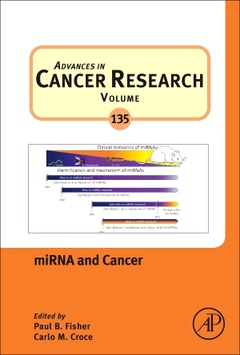Description
miRNA and Cancer
Director of collection: Tew Kenneth D.
Language: English
Subjects for miRNA and Cancer:
Keywords
Cancer; oncology; RNA; microRNA; gene expression; nucleotide; transcription; gene silence
Support: Print on demand
Description
/li>Contents
/li>Readership
/li>Biography
/li>Comment
/li>
miRNA and Cancer, Volume 135, the latest volume in the Advances in Cancer Research series, provides invaluable information on the exciting and fast-moving field of cancer research. This volume presents original reviews on research bridging oncology and gene expression, and includes specific chapters on Non-coding RNAs as Biomarkers of Cancer, The Enigma of microRNA Regulation in Cancer, Animal Models to Study microRNA functions, Non-coding RNAs and Cancer, microRNAs in Cancer Susceptibility, ts-RNAs versus microRNAs, microRNAs and AML, and microRNAs and Epigenetics.
1. MicroRNAs and Cancer: A Long Story for Short RNAsAlessandra Drusco and Carlo M. Croce2. The Enigma of miRNA Regulation in CancerAnjan K. Pradhan, Luni Emdad, Swadesh K. Das, Devanand Sarkar and Paul B. Fisher3. Animal Models to Study microRNA FunctionsArpita S. Pal and Andrea L. Kasinski4. Cancer Hallmarks and MicroRNAs: The Therapeutic ConnectionKatrien Van Roosbroeck and George A. Calin5. microRNAs in Cancer SusceptibilityBrid M. Ryan6. Role of the tRNA-Derived Small RNAs in Cancer: New Potential Biomarkers and Target for TherapyVeronica Balatti, Yuri Pekarsky and Carlo M. Croce7. MicroRNAs and EpigeneticsCatia Moutinho and Manel Esteller
Researchers and students in the basic and clinical sciences of cancer biology and oncology, plus related areas in genetics, immunology, pharmacology, cell biology, and molecular biology.
The Tew laboratory maintains an interest in using redox pathways as a platform to develop therapeutic strategies through drug discovery/development and biomarker identification. We interrogate how reactive oxygen and nitrogen species (ROS/RNS) impact cancer cells and develop novel drugs that impact on glutathione based pathways. Our research efforts have been integral to studies that have identified glutathione S-transferases (GST) as important in drug resistance, catalytic detoxification and as arbiters of kinase-mediated cell signaling events. In addition, we have been instrumental in defining how GSTP contributes to the process by which cells respond to ROS by selective addition of glutathione to specific protein clusters, so called S-glutathionylation. Each of these research areas has had broad impact on a number of cancer disciplines. Moreover, we have also been seminally involved in the Phase I to III clinical testing of three oncology drugs, Telcyta, Telintra and NOV-002. Other ongoing translational efforts have produced two ongoing clinical trials to measure the effectiveness of serum S-glutathionylated serine proteinase inhibitors as possible biomarkers for exposure to hydrogen peroxide mouthwashes and radiation.
- Provides information on cancer research
- Offers outstanding and original reviews on a range of cancer research topics
- Serves as an indispensable reference for researchers and students alike
These books may interest you

MicroRNA Targeted Cancer Therapy 158.24 €

MicroRNA Targeted Cancer Therapy 158.24 €

Non-coding RNAs and Cancer 116.04 €

